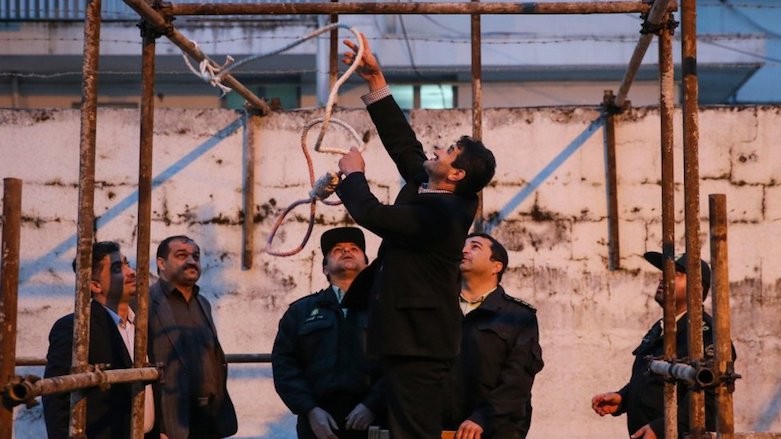Iran executes Kurdish political prisoners convicted in ‘unfair’ trial: Reports

ERBIL (Kurdistan 24) – Early Tuesday, Iranian authorities carried out the death sentences of two Kurdish political prisoners who were convicted of involvement in the bombing of a military parade a decade earlier, in a trial that rights groups have widely described as “unfair.”
A number of local and international human rights watchdogs had previously voiced concerns about the two, Sabir Sheikh Abdullah and Diyako Rasoulzadeh, after reports indicated that Urmia Prison officials had transferred the two Kurdish men to solitary confinement cells where they would await their execution.
Hours later, multiple Kurdish rights monitors reported that the facility—located in the West Azerbaijan province’s Urmia (Wirme) city—had carried out the sentences of both.
“The two prisoners were executed in front of the families of the thirteen people who were killed in the Mahabad bombing of a military parade ten years ago to mark the 30th anniversary of the Iran-Iraq war,” Hengaw quoted a source at the Urmia Prison as saying. Mahabad is another city in the Kurdish-majority West Azerbaijan province.
Iranian security forces reportedly arrested both Abdullah and Rasoulzadeh in March of 2014 in Mahabad. Three years later, the Mahabad “revolutionary court” condemned them to death on accusations of membership in the Komala party, a Kurdish opposition group with fighters inside Iran, and of having a hand in the 2010 bombing incident.
“The two young men were sentenced to death following a highly unfair trial based on confessions obtained under torture and ill-treatment,” Amnesty International said in a series of tweets early Tuesday, shortly before the executions were confirmed to have taken place.
Amnesty wrote that the two men had “strongly” rejected the allegations against them and that judicial authorities had “not heeded the complaints” of Rasoulzadeh and Abdullah about a “lack of access to a lawyer and being tortured during detention.”
The group also called on the Iranian government to stop such executions, as it would be “mere denial of justice and a catastrophic and irreparable violation of the right to life.”
The position of different Iranian officials regarding who was indeed behind the Mahabad bombing seemed all-encompassing at times, with some claiming Kurdish opposition parties were behind the attack—all of whom have denied it—or else members of the former Iraq regime or US “mercenaries.”
West Azerbaijan’s Islamic Revolutionary Guard Corps (IRGC) Commander, Abdolrasoul Mahmoudabadi, said in 2010 that an IRGC operation had killed thirty people in connection with the incident, including members of the former Iraqi Baathist regime and US mercenaries, AFP reported.
Related Article: Iranian border guards killed in armed exchange outside Kurdish city
Iran consistently ranks among the top countries with the highest number of deaths sentences it issues and implements, with minority groups being significantly overrepresented among those killed.
According to a Hengaw compilation of data on the number of executions throughout Iran, close to 24 percent of death sentences throughout the first six months of 2020 were carried out against Kurdish prisoners, most of whom were convicted on murder charges, but their number also included political activists.
One of those cases was that of Hedayat Abdullahpour, who “was sentenced to death by Iranian Supreme Court on October 8, 2018” on charges of affiliation with another Kurdish movement, the Democratic Party of Iranian Kurdistan (PDKI), the group said.
Amnesty said that Abdullahpour was sentenced to death “after a grossly unfair trial.” He was reportedly secretly executed by a firing squad.
Read More: Iran secretly executed Kurdish political prisoner in May: PDKI
Authorities often obtain confessions through the use of torture, various rights groups allege, especially in the case of individuals captured on suspicion of membership in or collaboration with opposition groups.
Later Tuesday, after both Kurdish men were killed, Amnesty issued another statement on the case of three other men who were recently sentenced to death for participating in the latest bout of anti-government protests in 2019.
Iran’s Ayatollah Khamenei “must quash the death sentences of protesters—Amirhossein Moradi, Saeed Tamjidi & Mohammad Rajabi—immediately!” the organization said. “Their trial was unfair & they said they were subjected to torture through beatings, electric shocks and being hung upside down.”
Editing by John J. Catherine
